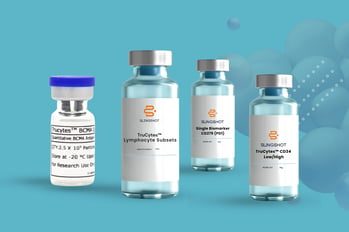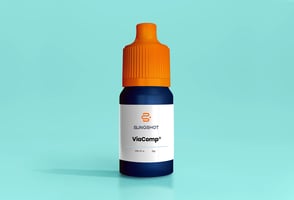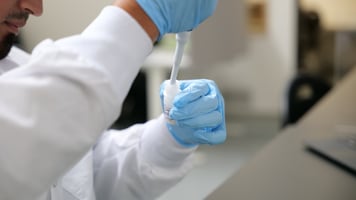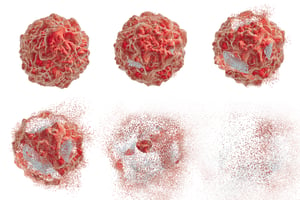Even viability dyes need controls. Don’t have time to “kill” a control for this? Don’t worry- we...
Unlocking the Power of TruCytes™ for Next-Generation Therapeutics
As the cell therapy landscape evolves, regulatory oversight is becoming more stringent. FDA regulation 21 CFR Part 1271 urges cell therapy manufacturers to address challenges like sterility, reproducibility of product lots, and control of impurities during the production process. The FDA also mandates potency and viability testing, ensuring that each product batch meets robust quality standards. With these heightened requirements comes an increased need for reliable reference controls to ensure the production of high-quality therapies. Enter TruCytes™—the off-the shelf reference control you didn’t know you needed, until now.
What are TruCytes™? 
TruCytes™ are polymer-based particles with specific protein markers embedded on their surface, that can be tailored to mimic specific attributes of most cell types. For example, TruCytes™ can mimic an exhausted or activated T cell. Unlike traditional cell lines, TruCytes™ are a ready-to-use, scalable, and reliable solution for in process control, reagent validation, and quality control. Their reproducible and consistent nature addresses many challenges associated with using cell lines in therapy development.
The Challenges of Traditional Cell Lines
While cell lines have been invaluable in the development of advanced therapies, they come with significant challenges. Over time, cell lines can accumulate genetic mutations, leading to genetic drift that diminishes the relevance and reproducibility of results. This drift complicates the translation of findings to clinical applications.
Additionally, cell lines can lose phenotypic traits over time, affecting their functionality and behavior—critical factors in therapeutic efficacy. Scaling up cell lines for large-scale production also presents difficulties in maintaining biological functionality and safety profiles, requiring meticulous monitoring and optimization.
Moreover, the financial burden of cell line development and maintenance is substantial. Costs can range from $10,000 to $100,000, factoring in cell isolation, genetic modification, and initial characterization. Maintenance involves ongoing expenses for reagents, media, labor, and quality testing, alongside compliance and regulatory documentation costs.
A New Era of Biomarker Controls for Cell Analysis
TruCytes™ offer a modern alternative.
Being non-biological, they eliminate the need for extensive maintenance, allowing for off-the-shelf use and direct application to your assays. The closed vial stability of TruCytes™ can extend up to 12 months, which limits the need for multiple bridging studies. Therefore, they are a reliable drop-in alternative for use in quality control and other applications.
TruCytes™ can serve as a reference for early characterization of patient starting material and as a system suitability control to ensure robust processes and assays. They are also ideal for reagent validation, such as validating antibody performance across different lots.
As cell therapy continues to show promise in treating diseases like leukemia and lymphoma, reducing manufacturing costs is crucial to expanding patient access. Incorporating TruCytes™ into your development workflow could support cost-efficiency and streamline your processes.
It's time to stop DIYing your cell therapy controls.
See TruCytes™ in Action
Slingshot Biosciences provides both off-the-shelf and customizable solutions tailored to your specific needs. Our TruCytes™ Lymphocyte Subset Control are ready-to-use cell mimics representing T, B, and NK cell populations.
But what makes TruCytes™ even more powerful is their customizability. See how others have developed their own TruCytes™ to revolutionize their workflows and processes.
Ready to create your own TruCytes™ control? Connect with an expert today!



